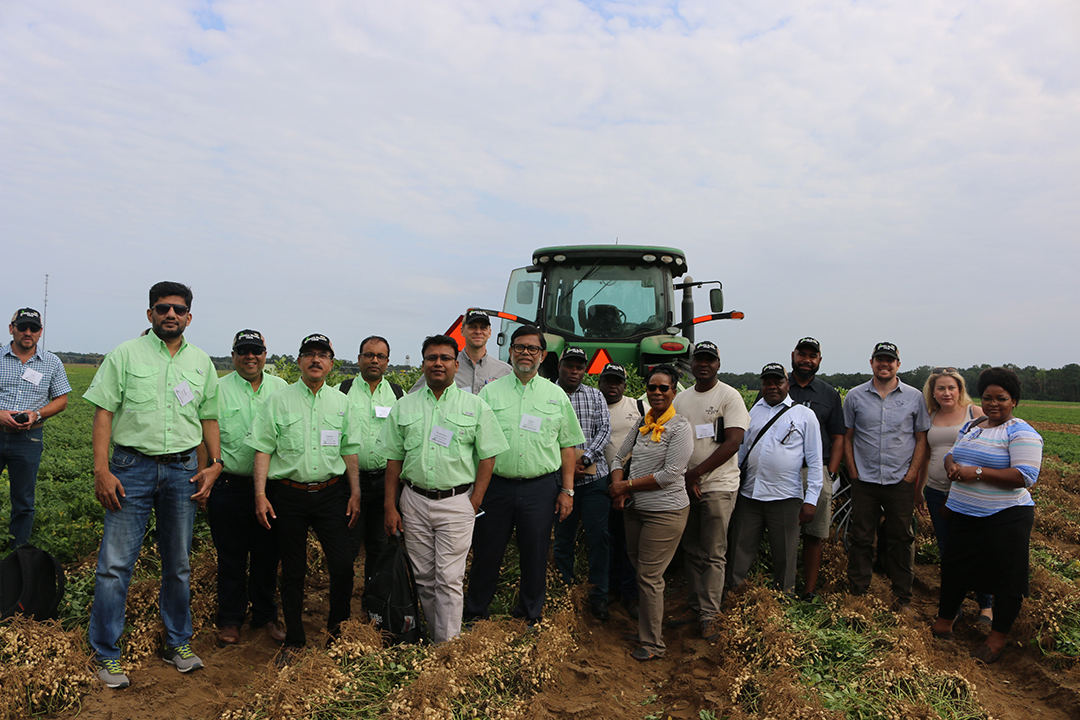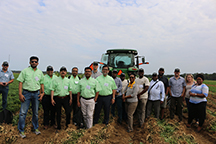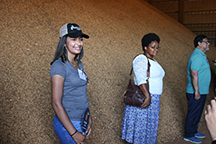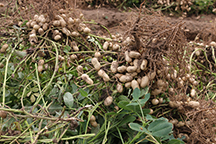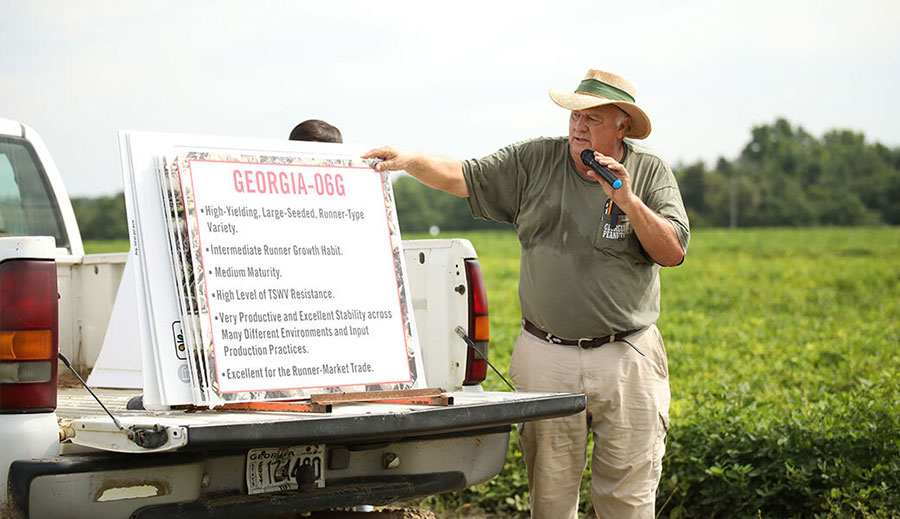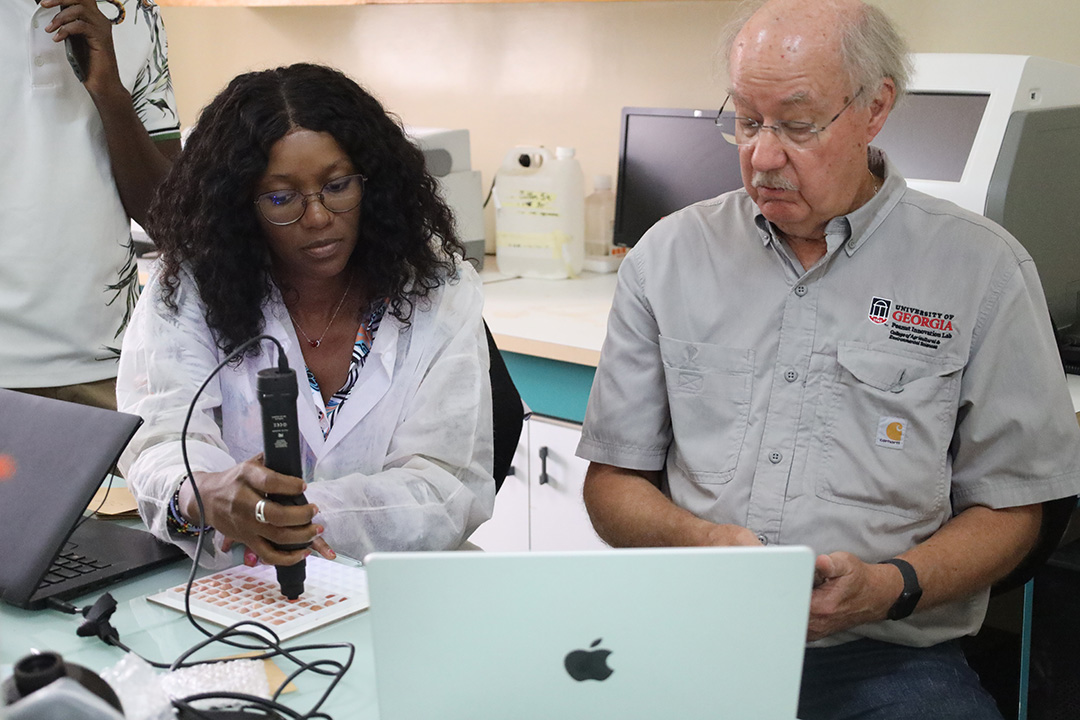The Peanut Innovation Lab bookended the annual Georgia Peanut Tour, the third week in September, with two more days of activities this year, giving two international groups an even deeper dive into peanut production in the state.
Held over three days in southern Georgia, the Georgia Peanut Tour takes over 200 people on a guided exploration of peanut production and processing, showing them how peanuts are planted, dug, dried and stored in Georgia. Each year, the tour also makes stops at research facilities and agri-businesses that play a role in peanut production, like input distributors, testing labs and equipment manufacturers.
Some highlights of this year’s trip included a farm growing organic peanuts, a small farm testing sustainability practices, a large farm using precision agriculture methods to maximize yield, a buying point, a commercial sheller, a manufacturer specializing in peanut processing equipment and a commercial boiled peanut facility.
For its international guests, the Peanut Innovation Lab added a trip prior to the tour to Birdsong Peanut’s shelling plant in Sylvester and JLA labs in Albany to learn more about quality control and aflatoxin management. Following the tour, one group visited the University of Georgia’s Griffin campus, which houses the Food Product Innovation and Commercialization (FoodPIC) Center, as well as the USDA national peanut germplasm collection, also located on the Griffin campus. Another group visited the Plains branch of Georgia Seed Development to learn more about the public/private partnership that manages publicly bred seed varieties in the state.
Several international groups attended this year’s 33rd annual tour, including representatives of South American agriculture companies and European media.
Two of the international delegations came as guests of the Feed the Future Peanut Innovation Lab, which has long-standing partnerships with agricultural professionals working to diversify crops in Malawi and is building relationships with similar groups in Bangladesh.
The lab has brought international partners to the tour for the past several years, giving colleagues an insight into the successful structure that Georgia has built over decades to bring peanuts to harvest, get them shelled and tested to root out contamination, store them safely and send them to manufacturers.
“I just see huge value in the tour,” said Cuan Opperman, who was attending his ninth Georgia Peanut Tour. Opperman began years ago to bring agricultural researchers from Malawi when he worked in southern Africa and this year organized a group from Bangladesh.
“The tour opens your eyes to new ways to do things, reinforces good practices you’ve seen before and gives a chance to stress to people back home how important it is to invest in agricultural infrastructure.”
Opperman’s current project, Rice and Diversified Crops (RDC) funded by the USAID mission in Bangladesh and managed by ACDI-VOCA, is working to diversify food crops in densely populated Bangladesh, where climate change is making agriculture more difficult. Peanuts could be an important part of the plan to feed a growing population while dealing with erratic climate.
The ACDI-VOCA team – Opperman, with Sami Saran,Haider Khan and Mominul Haque – brought professionals from Bangladesh’s food and agriculture private sector, including Sadid Jamil of Metal Ltd,Mostafizur Rahman of Partex Agro, Mohammed Huda of Naafco and Mahbub Anam of Lal Teer Seeds.
In Malawi, the USAID Agriculture Diversification Activity (AgDiv) is working with farmers who previously grew tobacco, bringing together leaf-growers, Malawi’s department of agriculture and the Peanut Innovation Lab to build a stronger peanut value chain in the country.
From Malawi, a delegation was organized by the USAID funded Malawi Agriculture Diversification Activity (AgDiv) and led by Elisabeth Sibale and Jeremy Venable, including visitors Keulo Salipira, Lawrent Pungulani, Grace Kaudzu and Justus Chintu of the Department of Agriculture Research Services of the Government of Malawi, as well as Cassey Clyde-Wiggins of Universal Tobacco/Limbe Leaf, Tadala Rambiki of Pyxus Agro and Riz Khan of Agriculture Transformation Initiative (Smoke Free World), part of a strategy to assist tobacco farmers in crop diversification.
“Over several years, we have seen how valuable the Georgia Peanut Tour can be for our overseas partners who are working to build and improve their variety development and seed multiplication systems, as well as other parts of the value chain,” said Peanut Innovation Lab Director Dave Hoisington. “Exploring successful systems in the U.S. and helping partners to find appropriate solutions to problems in their regions is what the innovation lab is all about.
“The Georgia Peanut Commission, UGA’s College of Agricultural and Environmental Sciences and the USDA-ARS Peanut Lab put together a valuable exploration of the peanut industry every year. We look forward to facilitating visits for the tour in future years.”
Check out photos from the tour on the Flickr page.

